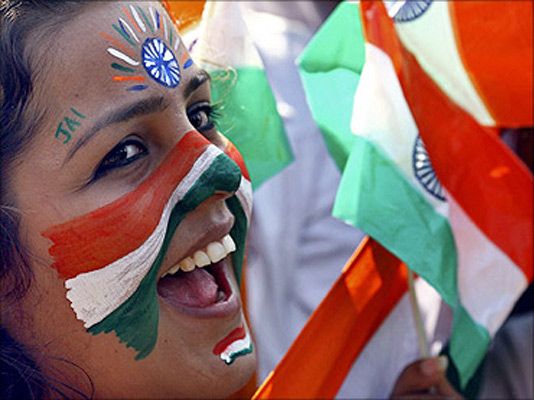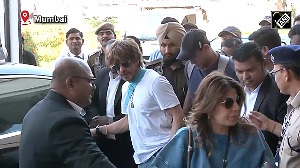There is a historic opportunity for India to take leadership in economic diplomacy, says Rathin Roy.
 This year, 2015, will mark three important initiatives in multilateral economic diplomacy.
This year, 2015, will mark three important initiatives in multilateral economic diplomacy.
First, the G20 will attempt to progress on International Monetary Fund (IMF) reform.
Second, the role and institutional structure of the BRICS-financed New Development Bank (NDB) will be articulated.
And finally, the financing framework for the post-2015 sustainable development goals (SDGs) will be agreed. But, as things stand, these three initiatives are being dealt with in silos.
A vision that brings these three events together can kick-start a permanent change in the international political settlement that defines the architecture of international public finance.
There is a historic opportunity for India to take leadership in this endeavour.
On IMF reform, a deal brokered by the United States to increase the voting shares of emerging economies in 2010, (allowing them a greater share in governance) and the quotas of all developing countries (allowing them to borrow more) is stuck since 2010.
The 2014 G20 summit communique explicitly asked the IMF and G20 finance ministers to present options to break this impasse at their next meeting, on February 10.
This issue was not discussed during US President Barack Obama's recent visit because it is the US Congress, not the president, that is holding up the deal. At present, there appear to be no options on the G20 table.
The status quo seems set to continue. This infuriates the emerging economies, but there is little they can do to change this reality other than invest in alternatives such as the NDB.
It was agreed at the 2014 summit of the BRICS countries - Brazil, Russia, India, China and South Africa - that India would nominate the first president of the NDB, a huge opportunity for India to exercise diplomatic leadership to shape a new institution that is effective in mitigating existing inequities in the global financial architecture.
This will require negotiation. Developed countries, and some influential voices in the Chinese establishment, would be happy to see the NDB as a second-rate alternative to the existing multilateral financial institutions with a BRICS face.
But it is in the interest of all emerging economies that the NDB is seen as a game-changing alternative. This will be the best spur to the stalled governance reforms of the IMF and the World Bank.
This requires fresh thinking and a rejection of the prudential "business as usual" practices that the BRICS finance-ministry bureaucrats engaged in the design of this institution are comfortable with.
There is no shortage of ideas on how this is to be done - but it is vital that the first presidency shape the bank to this purpose. To do this, we must take the word "development" in the NDB more seriously than the word "bank", and make it an effective partner in the world of development finance.
An opportunity to do this presents itself with the forthcoming discussions on the financing of the post-2015 SDGs. In July, governments will convene for the third conference on financing sustainable development, which will lay the framework for financing the SDGs that will be adopted by heads of government at the September United Nations summit.
To date, these "New York" discussions under the UN framework are being deliberately kept separate by Western countries from the stalled "Washington" discussions on institutional reforms of the IMF and the World Bank. They are, therefore, perceived as a sideshow with limited practical relevance.
This is a missed opportunity. Unlike in 2005, these financing discussions are not just, or even principally, about aid.
Global public goods, like stable growth and climate change action, require partnerships that drive resource transfers - the very opposite of aid-driven development.
Trade, climate finance and resource mobilisation issues are central to these negotiations, and emerging economies like India are both recipients and contributors to these processes. "Ideas changing minds" thus assumes greater importance than "money changing hands".
A grand bargain is, therefore, possible in 2015, whereby proposals for financing the SDGs can be negotiated as part of a broader framework agreement to deliver on governance reforms of the IMF and the World Bank.
There are concrete proposals that can be taken up to this end. For example, India could propose a standing conference on financing for sustainable development, similar to the United Nations Conference on Trade and Development and General Agreement on Tariffs and Trade initiatives of the 1980s.
This institution would negotiate reforms of the IMF and other "old" institutions as part of the overall package for financing the SDGs. India could also leverage the future design of the NDB into these discussions, enhancing emerging-economy authority and voice.
This requires forceful and persuasive political leadership to advocate a grand bargain that brings all three themes - the reform of "old" institutions like the IMF, the role of "new institutions" like the NDB, and the design of the long-term financing framework for the SDGs - to the same negotiating table.
At this moment, there is a global perception that India does have such leadership.
Top-level changes in our foreign, planning and finance bureaucracies have also brought in executive leaders with no stake in old silos and a track record in opening up new possibilities.
Will we take up the challenge and become a "yes, we can" player in economic diplomacy, as opposed to the "no, we won't" legacy that has been standard operating procedure for 40 years?
The writer is director, National Institute of Public Finance and Policy.













 © 2025
© 2025